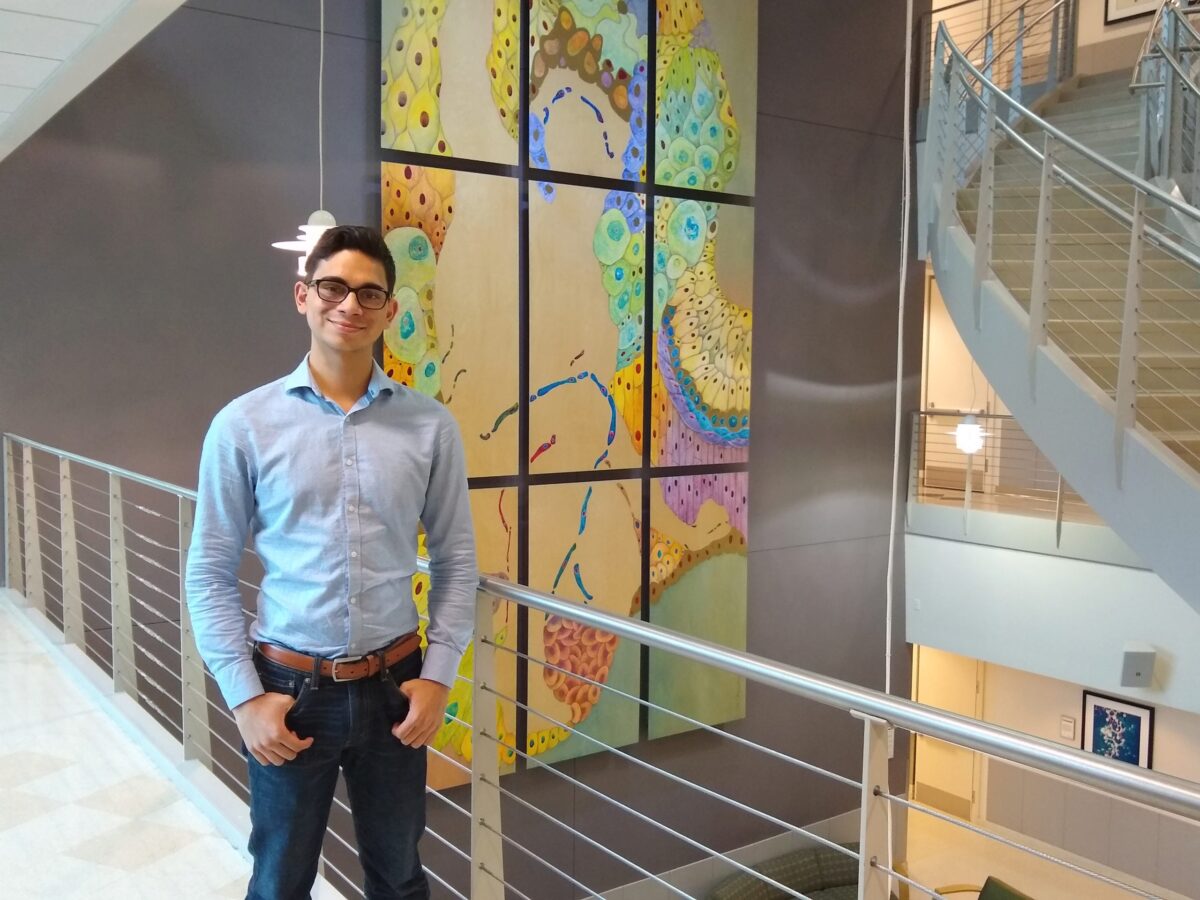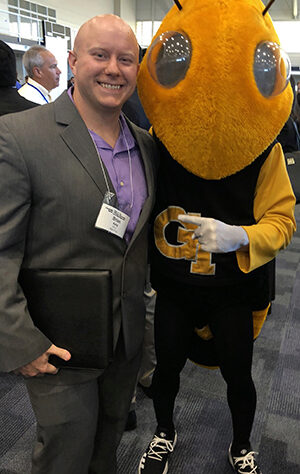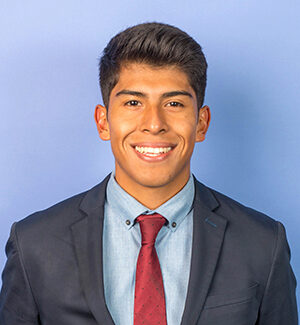First Class of Students Receive Woodruff School First Generation Fellowships
George W. Woodruff School of Mechanical Engineering graduate students Gian Rivera Crespo, Brian Kelly and Jairo Y. Maldonado-Contreras have been selected as the first class of students to receive a Woodruff School First Generation Fellowship.
The fellowships, which are sponsored by Shell, consist of $2,500 in funding and are awarded to first generation graduate students who demonstrate excellence in academics, factoring in research and external recognition. Financial need can also be considered.
Learn why each student chose to pursue graduate school, what impact they hope their current research will have, how it feels to be selected for the Woodruff School First Generation Fellowship and more in this collection of Q&As.
Gian C. Rivera Crespo

Q: Tell us a little bit about yourself. Where are you from? Where and what did you study as an undergrad?
A: I was born and raised in Vega Baja, Puerto Rico. It is a mid-sized city on the north part of Puerto Rico, most people probably know it because it has one of the nicest beaches on the island. I went to the University of Puerto Rico and studied mechanical engineering for my undergraduate degree.
Q: What inspired you to pursue graduate school? Why did you choose the Woodruff School?
A: I got involved in undergraduate research my first year and really loved the community and work. My initial plans were to graduate as quickly as possible and get a good engineering job, but my PI and graduate mentors in the lab were such an inspiration that I could not see myself doing anything else! I chose the Woodruff School because it has professors and research areas that I did not see being pursued anywhere else. The summer before applying I also worked with Dr. Fedorov and his (now Dr.) PhD student Mason as part of the SURE program and was blown away, so there was no doubt in my mind that Tech was where I wanted to be at.
Q: Can you tell us a little bit about your research?
A: I am in Dr. David Ku’s Biofluids and Medical Device Research Group. My work during this first year has been focused on developing a primary hemostasis model that can be used to predict hemorrhage times and volumes following a traumatic vascular injury. I am very excited about developing this project from scratch as it combines my interests in fluid mechanics and surgery, while providing some interesting biophysical and clinical insights to the treatment of trauma.
Q: How does it feel to be selected for the Woodruff School First Generation Fellowship?
A: It is honestly surprising, and I am very honored. I think the best part for me was talking to my grandparents about it and seeing how proud they were.
Q: How will the fellowship help advance your research?
A: It really helps actually. I left my car in Puerto Rico and was looking to buy another one so I can help my lab do blood runs for our clotting experiments.
Q: What impact do you hope your research will have?
A: My main hope is that my research is clinically translatable and improves patient treatment and outcomes in any small way.
Q: What does being a first-generation graduate student mean to you?
A: Being a first-generation student was and is a struggle at times, but for me it was something that helped foster a go-getter attitude to everything in life. There are many things that must be learned by first hand experiences, and I think struggling through these early in my academic career helped set me up to be the person I am now at Tech.
Q: What advice would you give to other first-generation students?
A: Always ask. Ask about something you are curious about, about things you’d like to do in the future, and about how to get there. I had so many questions and doubts when I first got to my university, and getting over the initial hurdle of being afraid to ask was a breakthrough moment. It is important to ask and start talking about these things, because it leads to asking about things you didn’t know you wanted to know about later on!
Q: What clubs/organizations are you involved in?
A: The main one is the Big Brothers and Big Sisters of Metro Atlanta. It’s something I hold dear to my heart and I am looking to get involved with during my time at Tech.
Q: Where are you spending the summer?
A: I am spending the summer here in Atlanta, taking classes and working on my research project. Hopefully I'll finish writing up my results!
Q: What do you like to do outside of Tech?
A: I like to play board games and go out to eat with my friends. Before COVID-19 I had bought some new board games to try out with my friends, which we will hopefully get to try out soon enough!
Q: What are your plans after grad school?
A: That’s difficult to be sure about given I still have most of grad school left! My current plans are to do an MD after my PhD, hoping to somewhat emulate my advisor and eventually work as a professor or in any capacity as a researcher.
Q: What advice would you give to other graduate students who would like to apply for a fellowship in the future?
A: My friends always ask me look over their essays for fellowships and other applications, and the main thing I always say is to tell your story. Everyone has a unique and interesting story, don’t be afraid of writing what makes you unique instead of fitting your essays into a generic format. If you can capture a reader’s attention at the beginning of your application you will stand out.
Brian J. Kelly
 Q: Tell us a little bit about yourself. Where are you from? Where and what did you study as an undergrad?
Q: Tell us a little bit about yourself. Where are you from? Where and what did you study as an undergrad?
A: I was born in Warner Robbins, GA but grew up in a small town in southwest Washington state called Longview. In Longview I attended Lower Columbia College (community college) and switched my major many times before settling on mechanical engineering. I then transferred to Washington State University Vancouver where I finished my bachelors and master’s in mechanical engineering focusing on the development of thermal management systems.
Q: What inspired you to pursue graduate school? Why did you choose the Woodruff School?
A: Even when I was in community college, I was interested in study past the bachelor level. As I got closer to graduation I began to participate as a research assistant and that locked in my choice, as I enjoyed the high-tech innovation. I chose the Woodruff School because of the access to so many top thermal science research groups and the welcoming experience I had during my interview.
Q: Can you tell us a little bit about your research?
A: I work for Dr. Samuel Graham in The Graham Lab. I also have a collaborative appointment at the National Renewable Energy Laboratory (NREL), Center for Integrated Mobility Sciences, which is where I am currently located. I am working on the development of a novel dbc-less power electronic package with integrated thermal management. This requires a multi-disciplinary approach of thermal-hydraulic-mechanical design.
Q: How does it feel to be selected for the Woodruff School First Generation Fellowship?
A: It is great to be recognized for my achievements as a first generation scholar and be a representative for first generation students.
Q: How will the fellowship help advance your research?
A: I recently took a collaborative appointment at the NREL and the fellowship helped with relocation. Also, it helped getting a quality work from home set-up since we are currently social-distancing due to the COVID-19 pandemic.
Q: What impact do you hope your research will have?
A: I hope my research helps drive the adaptation of electric vehicles.
Q: What does being a first-generation graduate student mean to you?
A: Being a first generation student means a lot of things to me. Early on in my college career, I felt very lost and I didn’t grow up with any adults who had attended college before. I learned to make up for this by finding many mentors at my various education institutions.
Q: What advice would you give to other first-generation students?
A: While I believe it is important for everyone to find mentors, it is even more vital for first generation students. Also, take the time to really understand the education system and secondary skills necessary to be a successful professional.
Q: What clubs/organizations are you involved in?
A: Prior to my collaborative appointment at NREL, I was the first cohort of Graduate Career Peer Mentors for C2D2 which was a fun experience.
Q: Where are you spending the summer?
A: I will be at NREL until next summer.
Q: What do you like to do outside of Tech?
A: I am an experienced strength athlete and avid gamer.
Q: What are your plans after grad school?
A: Still working this out (I am interested in too many things)!
Q: What advice would you give to other graduate students who would like to apply for a fellowship in the future?
A: Try to standout among your peers by getting involved on campus and getting to know professors and students outside your lab groups.
Jairo Y. Maldonado-Contreras
 Q: Tell us a little bit about yourself. Where are you from? Where and what did you study as an undergrad?
Q: Tell us a little bit about yourself. Where are you from? Where and what did you study as an undergrad?
A: My name is Jairo Yobani Maldonado-Contreras. I was born and raised in Santa Maria, CA. I was raised by my single mother, Rosa Contreras, who worked in the strawberry fields to get me through my early education. After high school, I moved to Long Beach, CA to pursue a B.S. in Mechanical Engineering at Long Beach State University (LBSU). I was the first in my family to attend college.
Q: What inspired you to pursue graduate school? Why did you choose the Woodruff School?
A: As a sophomore at LBSU, I joined the Robotics and Interactive Systems Engineering Laboratory – a research lab focused on developing rehabilitative technologies for people with disabilities. Developing novel and impactful technology inspired me to pursue a career in research. I choose to attend the Woodruff School because of its line-up of professors. I knew that I could find a research lab to fit my interests and have access to a variety of experts in robotics, machine learning, design, and human biomechanics.
Q: Can you tell us a little bit about your research?
A: I work for Dr. Aaron Young in the Exoskeleton and Prosthetic Intelligent Controls (EPIC) Lab. My research focuses on developing intention recognition algorithms that allow lower-limb robotic prostheses to execute the intended movements of users across a variety of environments – ramps, stairs, and level-ground. Currently, I am working on estimating the level of incline while walking. The goal is to use this information to scale joint torques towards optimal levels of assistance.
Q: How does it feel to be selected for the Woodruff School First Generation Fellowship?
A: It is a great honor. As a recipient of the fellowship, I feel empowered to achieve my goals while embracing my status as a first-generation student. It serves as an acknowledgment of all the hurdles my mother and I have overcome as new Americans.
Q: How will the fellowship help advance your research?
A: The fellowship will help fund the purchase of a desktop computer capable of processing complex machine learning algorithms. Such a computer will significantly reduce the computation time of my research tasks.
Q: What impact do you hope your research will have?
A: I hope my research will enable lower-limb amputees to regain safe and natural mobility.
Q: What does being a first-generation graduate student mean to you?
A: Being a first-generation graduate student means that the future well-being of my family is dependent upon my success in graduate school and afterward. This drives me to succeed.
Q: What advice would you give to other first-generation students?
A: I would advise first-generation students to become experts in seeking out resources and opportunities. As a first-generation student, I often missed out on valuable experiences because I did not have mentors to guide me in the right direction.
Q: What clubs/organizations are you involved in?
A: I am involved in the Latino Organization of Graduate Students (LOGRAS). As a member of the outreach committee, I help organize events that introduce underrepresented students to STEM and higher education through a series of workshops. I also serve as a mentor at a local high school robotics club. I help them design and build robots for competitions.
Q: Where are you spending the summer?
A: I will spend the summer in Atlanta researching from home. My goal is to get a research paper out by the end of the break.
Q: What do you like to do outside of Tech?
A: Outside of my classes and research, I like to play soccer at Tech or local pick-up spots. Tech has a great community of soccer players.
Q: What are your plans after grad school?
A: My current plans are to become a professor after grad school. I enjoy teaching and would like to have a positive impact on the lives of students. Also, the idea of having my own research laboratory is exciting.
Q: What advice would you give to other graduate students who would like to apply for a fellowship in the future?
A: A few hours of writing is worth the reward. Fellowships like this one can really make the difference when it comes to paying for school supplies - like a much needed desktop.
